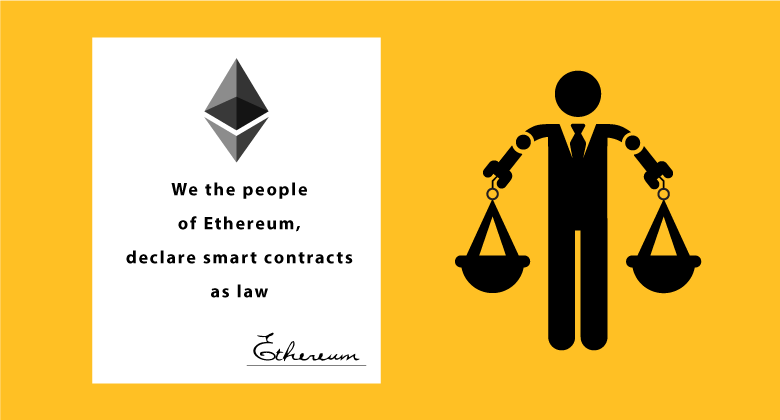Ethereum Smart Contracts: A Guide to The Genius of Blockchain
Smart contracts aren’t a new idea, but they are an integral part of a new innovative concept called the blockchain. Although Ethereum will not be replacing contract law immediately, traditional methods are being augmented and Ethereum may eventually become law.
As long as two decades ago, Nick Szabo believed that a contractual clause could be implemented within software in order to make contract infringement very expensive. According to Szabo, a “Smart Contract” is a computerized transaction protocol that executes the terms of a contract. This means the protocol automatically enforces the terms of the contract by constantly checking if they have been met.
These smart contracts are now being used together with blockchains to help many different industries such as smart properties, financial services, digital rights management, etc. Surely, a technology like this isn’t just limited to law.
Smart Contracts Will Remove the Middleman
What is the biggest benefit of using this technology over traditional methods? It is much more efficient because it allows smart contracts a greater overview of the entire process. This further facilitates security for “expectations” that might pop up due to accidental negligence.

As mentioned before, this idea isn’t new, so Ethereum is not the first project that has attempted to develop a smart contract. Ethereum, however, realized the power of decentralized ledgers and developed a key component missing from Bitcoin’s blockchain: a Turing-complete programming language. The Ethereum stack-based bytecode language allowed for incredible efficiency in processing. This, combined with their token system, has allowed for the development of smart contracts.
Ethereum is Not Law… for Now
These contracts, however, aren’t law. According to those in the IT industry, smart contracts are “a mutual agreement outside of jurisdiction”, but lawmakers do not agree. Legislators believe that nothing is outside of their jurisdiction, so it could be a long time before the foundations of law are replaced.

For now, Ethereum’s goal is essentially to replace the small parts, corks, and screws of traditional contracts. Ethereum works side-to-side or independently with traditional contracts. Replacing parts of the original contract so long as the two parties mutually agree on its use. This gives Ethereum smart contracts a chance to automate, making the process far more efficient than if it were handled manually. This would also take less manpower, meaning less financial costs.
Just How Smart are They?
Although the technology seems unlimited now, we must also understand smart contracts’ inherent technological limits. For example, a smart contract can not completely handle a system that includes domestic and international laws. A smart contract would require specifically developed artificial intelligence (not current AI, but Terminator 2 level AI), in order to handle complications that can arise within that habitat.
This means that although the technology is very powerful in replacing some complications, it will take time before it becomes a commonly used asset. First, the traditional definition of “legally binding” will need to be broadened. This would make a new job category possible, intertwining IT and law into a new and exciting field thanks to Ethereum’s invention. Currently, smart contracts are akin to an IFTTT between contracting parties.
Self-Running Businesses: DAO
Although smart contracts are not AI smart right now, they can still perform incredible tasks in an automated fashion. The concept of DAOs is especially exciting. Decentralized Autonomous Organizations are operated by rules hard-coded into smart contracts. This means that if jurisdiction permits, DAO’s could replace all public documents along with the third parties and essentially handle all the paperwork for a company. Keep in mind that is an ideal scenario.
A critical concern during the development of DAO’s is that these hard-coded contracts are now law, and it isn’t as easy to change the law. In essence, if a bug escapes from development, that flaw will be abused because it is now within the law. This is what happened during The DAO attack and why it became such a huge controversy after it was voted by majority hash rate. It was legal and you cannot change laws simply because it benefits someone.
To recap:
- Smart contracts are computerized protocols that handle the execution of terms within an agreement.
- Ethereum smart contracts are the first successful development of the blockchain ledger.
- The traditional law will take time to replace, but so far the technology has been very successful in replacing and automating the small and annoying parts of a contract.
Rethinking Law in Contracts
Once we begin to stretch the boundaries of law in congruence with this technology, developers of these contracts will become a necessary tool to have. Even now, it saves time and labor, which is very critical in today’s startup grind.
How these changes will take effect is a very difficult question to answer. An individual must be thoroughly educated on the complex idea of blockchains in order to understand the extent and limits of smart contracts.
Though very innovative and groundbreaking, smart contracts need time to develop, just like any technology. There is no need to rush into manipulating the basic principles of what makes us human: our rights in law.